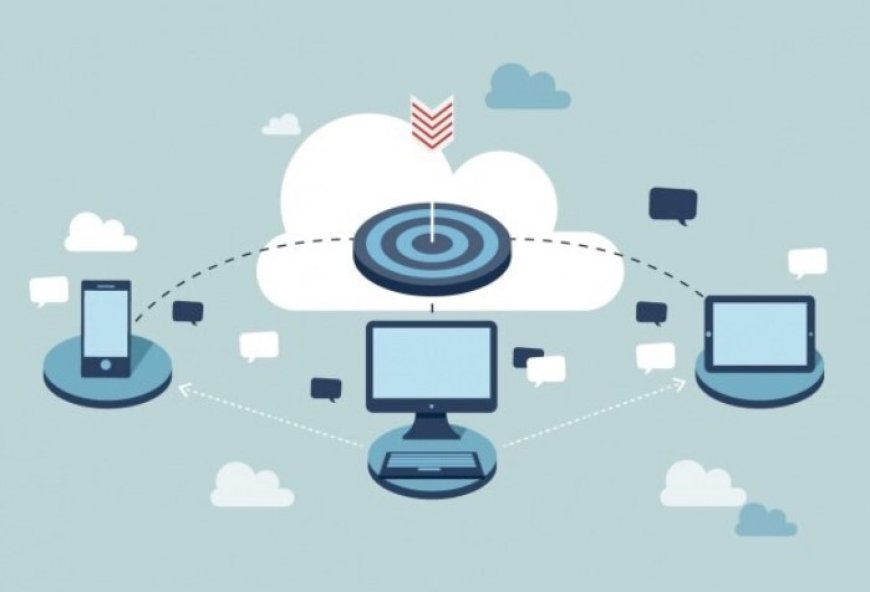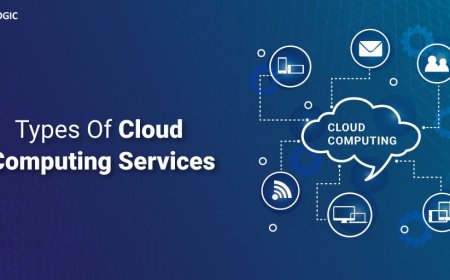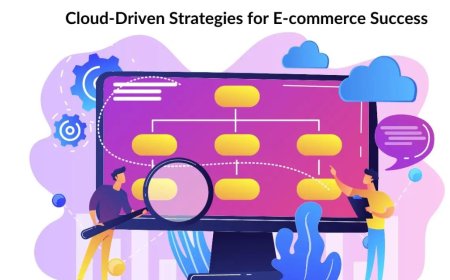Cloud Computing Basics: A Beginner’s Guide
Explore the fundamentals of cloud computing in our beginner's guide. Learn how the cloud works, its benefits, and key concepts to get started with cloud technology.

In today's tech-savvy world, cloud computing is a big deal. But what is it exactly? Well, it's like renting computer power and storage on the internet. It's important because it makes life easier for us. Think about it, we store photos and files on our phones and computers, but what if they crash? Cloud computing keeps a copy of your stuff safely on the internet.
Cloud computing is becoming super popular for businesses, too. They use it to run software, store data, and more, all without needing expensive computer servers. It's like a virtual computer that can do many jobs.
As technology grows, so does the need for cloud computing. It's like a big toolbox in the sky that's always there when you need it. Whether you're taking a photo on your phone, streaming a movie, or even running a business, chances are you're tapping into the cloud. It's not just a buzzword; it's a game-changer in the digital age, making our lives easier and businesses more efficient. So, when you hear about the cloud, remember, it's like having your own piece of the internet to make things happen.
Challenges and Complexity
Using the cloud has tons of perks, but it's not all smooth sailing. There are some challenges that come with it, and it's important to know about them.
First off, think about all the photos, videos, and files you have on your phone and computer. When you use the cloud, all that stuff gets stored on someone else's computer, far away. It's like sending your belongings to a storage unit. But what if something happens to that storage unit? That's one of the challenges of cloud computing - making sure your data is stored and managed safely.
Then there's the issue of security and privacy. When you use the cloud, you're trusting someone else to keep your stuff safe. It's like giving the keys to your house to a friend and hoping they won't lose them. So, it's really important to choose a reliable cloud service with strong security measures.
Now, picking the right cloud service can be a bit tricky. It's like choosing a phone plan - you want one that fits your needs. Some services are great for storing lots of data, while others are better for running specific programs. It's like picking the right tool for the job.
So, while the cloud is super useful, it's not without its challenges. Making sure your data is safe, choosing a trustworthy service, and managing all your stuff can be a bit tricky. But with the right know-how, you can navigate these challenges and make the most out of cloud computing.
What are the Main Types of Cloud Services?
Cloud services are like different tools in a toolbox, each designed for specific tasks. There are three main types of cloud services: Infrastructure as a Service (IaaS), Platform as a Service (PaaS), and Software as a Service (SaaS). These cloud services help people and businesses with different needs, whether it's building websites, running software, or managing data.
Infrastructure as a Service (IaaS):
Think of IaaS as the foundation or the base layer of cloud services. It's like renting the raw materials and tools you need to build something without worrying about the construction site. IaaS provides virtualized computing resources over the internet, such as virtual machines, storage, and networking. This means you can create and manage your own virtual servers and storage spaces without owning any physical hardware.
For example, if you want to build a website, you can use IaaS to rent virtual servers and storage. You don't need to buy physical servers and can scale your resources up or down as needed. It's like renting a construction site, complete with tools and materials, for your website project.
Platform as a Service (PaaS):
PaaS takes things a step further. It's like moving from the construction site to a ready-made workshop where you can build your projects with pre-existing tools and materials. PaaS provides a platform with tools and services for developers to build, test, and run applications. This platform includes software development tools, database management systems, and application hosting.
Let's say you're a developer creating a new mobile app. With PaaS, you don't need to worry about managing the underlying infrastructure or the tools for coding. You can focus on writing the code for your app while the PaaS provider takes care of the server setup, databases, and other technical details.
Software as a Service (SaaS):
SaaS is like the finished product that you can use right away. It's the top layer of cloud services, offering fully developed software applications over the internet. With SaaS, you don't have to worry about software installation, maintenance, or updates because it's all managed by the service provider.
Think of common SaaS applications like email, word processors, or customer relationship management (CRM) software. Instead of installing these programs on your computer, you access them through a web browser. It's like using a car-sharing service – you don't need to own a car; you can simply rent one when you need it.
-
IaaS provides the basic building blocks for IT resources, like virtual servers and storage.
-
PaaS offers a platform for developers to build and run applications without managing the underlying infrastructure.
-
SaaS delivers fully developed software applications that you can use without worrying about installation or maintenance.
Each type of cloud service has its own unique advantages and is tailored to different needs. Whether you're a developer, a business owner, or an individual user, understanding these cloud service types can help you choose the right tools for your specific tasks. So, next time you hear about IaaS, PaaS, or SaaS, you'll know they're like the tools in your cloud computing toolbox, ready to help you get the job done.
How Does Cloud Computing Work?
Imagine the cloud as a giant invisible computer that can do all sorts of tasks. When you use cloud services, you're basically borrowing a part of this giant computer to store data, run software, or perform other tasks. Here's how it works:
Data Storage: When you save files, photos, or videos on the cloud, they're actually stored on a remote computer, often called a server. These servers are kept in data centers, which are like super-secure warehouses full of computers. Your data is kept safe and can be accessed from anywhere with an internet connection.
Software on Demand: Instead of installing software on your own computer, you can use it from the cloud. Think of it like streaming a movie. You don't need to have the movie stored on your device; you can watch it online. Similarly, you can run software directly from the cloud without the hassle of installations and updates.
Access from Anywhere: Cloud computing allows you to access your data and applications from different devices, like your smartphone, tablet, or computer. As long as you're connected to the internet, your cloud-stored stuff is just a click away.
Scalability: The cloud is flexible. If you need more storage space, computing power, or any other resource, you can easily scale up. It's like adding more seats to a table when unexpected guests arrive.
Security and Backup: Cloud service providers take security seriously. They use encryption and other measures to keep your data safe. Plus, since your data is stored in multiple locations, it's less likely to be lost. It's like having multiple copies of your important documents.
Benefits of Using Cloud Services
Using cloud services comes with a bunch of perks:
-
Cost-Efficiency: No need to buy and maintain your own servers or software. You pay for what you use, which can be more cost-effective, especially for businesses.
-
Flexibility: You can access your stuff from anywhere, anytime, as long as you're connected to the internet. It's like having your files and applications in your pocket.
-
Accessibility: Cloud services often have user-friendly interfaces, making it easier to work with software and manage data. This accessibility is great for both individuals and businesses.
-
Automatic Updates: No more worrying about updating software. Cloud service providers handle this for you, ensuring you have the latest features and security patches.
-
Scalability: Whether you're a small business or a large enterprise, the cloud can grow with you. If you need more resources, you can scale up without major headaches.
-
Collaboration: Sharing and collaborating on documents is a breeze. Multiple people can work on the same document simultaneously, from different locations.
Individuals and Businesses Get Started with Cloud Computing
Getting started with cloud computing is easy:
-
Choose a Service: Pick a cloud service provider that suits your needs. Some popular options include Amazon Web Services (AWS), Microsoft Azure, Google Cloud, and various SaaS providers like Google Workspace or Microsoft 365.
-
Create an Account: Sign up for an account with your chosen provider. This typically requires an email address and a password.
-
Learn the Basics: Familiarize yourself with the services and tools available. Most providers offer user-friendly interfaces and helpful documentation.
-
Start Small: Begin with simple tasks like storing files or using cloud-based software. As you get more comfortable, you can explore advanced features.
-
Secure Your Account: Use strong passwords and enable two-factor authentication for added security.
-
Regularly Backup Data: Even in the cloud, data loss can occur. Make sure to back up your important files to ensure you don't lose them.
-
Explore and Learn: The more you use the cloud, the more you'll discover its capabilities. There are many online resources, courses, and communities to help you become a cloud computing pro.
Cloud computing offers a bunch of benefits like easy access to data, cost savings, and flexible use of software. It's not just for big companies; it's useful for everyone. From students to businesses, it's changing the way we work and store information. The cloud is becoming more important in areas like education, business operations, and even gaming. So, it's worth exploring. Learning more about cloud technology can help you make the most out of this powerful tool. Try it out, and you'll discover how it can make your online life easier!





























































